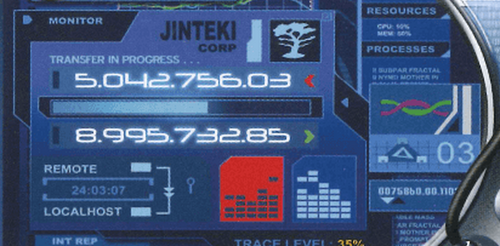
This week ends in approximately 22 minutes and counting.

Michael Lewis’ new book on high-frequency trading, FLASH BOYS, is stunning. While free markets are based on the relatively fair flow of information between players, FLASH BOYS shows how profitable it can be to obfuscate and restrain that information.
Lewis describes one small group’s efforts to restore the fairness of information in the market. It’s a story that couldn’t happen in the traditional web of non-solicits and non-competes that decorate contracts like ornaments at Christmas. Thankfully the major actors in FLASH BOYS weren’t bound by them and worked to improve the market. Otherwise it would have been a short book - a few key people had an idea on how to restore fairness to the market but couldn’t.
These other, more common restrictions on the free flow of information within a market trouble me1. I understand and respect intellectual property but I cry foul when companies claim IP within their employees. It clearly hurts the market, but also wreaks havoc on the individuals caught up in it as well.
If a company can’t lazily leverage legalese for retention, they are forced to invest in their employees and in their culture. If each employee feels valued and empowered there is no incentive to leave the company to follow ideas and passions. Employers must make it absurd to consider leaving to compete against them. It’s a scenario where all parties benefit but it isn’t easy.
If you get the chance, FLASH BOYS is filled with insights like these and I can’t recommend it enough. A number of ideas have stuck with me from it and I continue to mull them over. You’re likely to see more of them within this space.
SP
particularly as I am currently bound by them. ↩

I’ve started work on another game, title officially TBD but let’s call it MO for now. The goal is to build an asynchronous multiplayer turn-based strategy game that takes about 30-60 turns with about 3-5 “actions” per turn.
I’m still fleshing out the mechanics, but I want to share my principles / constraints so far:

My megacorporation is on the wrong side of a wealthy Criminal playing a nasty Account Siphon. Not only would would that steal nearly half my credits, but it would boost his level of wealth from “Jay-Z” to “Scrooge McDuck.” A single trace is my only chance to stop him and we both know it. If the trace succeeds then he’s forced to end his run against my servers. My money would be safe, but for the trace to succeed I’d have to spend more credits then I stand to lose.
Netrunner overflows with these dilemmas. How much pain do I endure to guarantee my foe doesn’t profit? Did he know going into this that I could stop him at great cost, and just wants me to waste the credits? There’s rarely an answer that’s always correct regardless of the circumstances. While I try to win, I play to wrestle with these dilemmas of the moment.
A few people have gathered around the table. As I announce my decision about the trace, one of these watchers openly asks “WHAT! Are you INSANE?”
Hmmm.
“WHAT! Are you INSANE?”
Same sentiment but this is nearly five years earlier at approximately 1 A.M. I’m at the final table of a friendly poker tournament, playing against the final two others when I fold a hand that bring jeers, howls, and even a stern rebuke from the onlookers.
I smile nervously but say nothing. My hands tremble when I’m extremely excited - they’re my tell and so I hide them under the table. Moments later, the round ends, the crowd cheers, and this became a hand we still talk about today. It isn’t because another player was knocked out despite a good hand, but because I’d have been knocked out despite an amazing hand. I read the state of the entire table, figured the leader had a truly phenomenal hand, and played accordingly.
Folding may be losing but that play still feels better than winning. In poker I maybe get one or two of those moments every few games, moments when you see through the Matrix and really are playing the person across the table from you rather than just the cards in your hand. It’s rare though. I spent a lot of time in poker chasing that dragon.
Netrunner is full of those moments. With so many public, discrete bits of information, every turn matters and there are continuous revelations about the state of the game and players. There’s enough mechanical complexity to make a puzzle to ponder, but still enough ambiguity to play the players and not just the mechanics.
There are many reasons I am having a torrid love affair with Netrunner lately but this may be chief amongst them.
“WHAT! Are you INSANE?”
Back to the dystopian future of Netrunner. I do nothing. I let the trace fail, presenting no challenge to the runner whatsoever and leaving the door wide open to the Account Siphon. I could have shut it down entirely for just one more credit than I lose to it. Instead I left our corporate bank account numbers and a nice glass of tea in our reception area.
Like me, the runner now faces a choice: continue and steal my money, or end the run now and reap no rewards or consequences. It looks like a trap. It looks like a bluff. It looks like an amateur mistake.
I think to myself “Please don’t end the run. Please steal my credits.” I remain silent, doing my best to act annoyed and resigned. I hide my hands beneath the table - they’re my tell.
Thankfully, my opponent’s greed gets the better of him. He finishes the run and takes his ten credits. He also suffers the side effects of an Account Siphon. The runner is automatically tagged, an effect that basically means my giant, powerful megacorporation knows where this little hacker lives.
I use this tag to kill him immediately on the next turn. The game ends and he is a corpse, albeit a fabulously rich one.
I don’t particularly care about the win. That’s not what I’ll remember. I’ll remember the pivotal moment of two decisions - my decision not to resist, and the runner’s decision to continue. Netrunner provides so many of these choices and opportunities to react that I can’t help but love the game even when I’m on the losing side of these decisions.